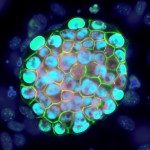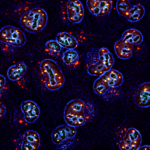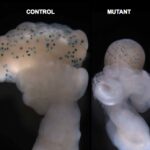Link to Pubmed [PMID] – 15988037
Mol. Cell. Biol. 2005 Jul;25(14):6289-302
While highly conserved through evolution, the cell cycle has been extensively modified to adapt to new developmental programs. Recently, analyses of mouse mutants revealed that several important cell cycle regulators are either dispensable for development or have a tissue- or cell-type-specific function, indicating that many aspects of cell cycle regulation during mammalian embryo development remain to be elucidated. Here, we report on the characterization of a new gene, Omcg1, which codes for a nuclear zinc finger protein. Embryos lacking Omcg1 die by the end of preimplantation development. In vitro cultured Omcg1-null blastocysts exhibit a dramatic reduction in the total cell number, a high mitotic index, and the presence of abnormal mitotic figures. Importantly, we found that Omcg1 disruption results in the lengthening of M phase rather than in a mitotic block. We show that the mitotic delay in Omcg1-/- embryos is associated with neither a dysfunction of the spindle checkpoint nor abnormal global histone modifications. Taken together, these results suggest that Omcg1 is an important regulator of the cell cycle in the preimplantation embryo.




